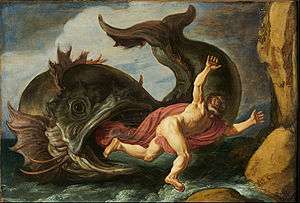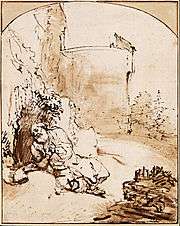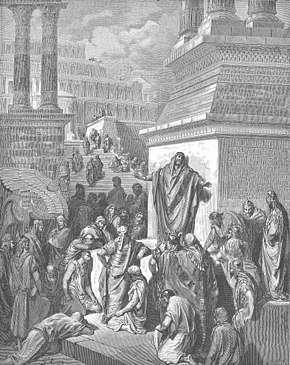Book of Jonah
The Book of Jonah is a book of the Nevi'im ("Prophets") in the Hebrew Bible. It tells of a Hebrew prophet named Jonah son of Amittai who is sent by God to prophesy the destruction of Nineveh but tries to escape the divine mission.[1] Set in the reign of Jeroboam II (786–746 BC), it was probably written in the post-exilic period, some time between the late 5th to early 4th century BC.[2] The story has a long interpretive history and has become well known through popular children's stories. In Judaism, it is the Haftarah portion read during the afternoon of Yom Kippur to instill reflection on God's willingness to forgive those who repent;[3] it remains a popular story among Christians. It is also retold in the Quran.

Narrative
Unlike the other Prophets, the book of Jonah is almost entirely narrative, with the exception of the poem in chapter 2. The actual prophetic word against Nineveh is given only in passing through the narrative. As with any good narrative, the story of Jonah has a setting, characters, a plot, and themes. It also relies heavily on such literary devices as irony.
Outline
- Jonah Flees His Mission (chapters 1–2)
- Jonah's Commission and Flight (1:1–3)
- The Endangered Sailors Cry to Their gods (1:4–6)
- Jonah's Disobedience Exposed (1:7–10)
- Jonah's punishment and Deliverance (1:11–2:1;2:10)
- His Prayer of Thanksgiving (2:2–9)
- Jonah Reluctantly fulfills His Mission (chapters 3–4)
- Jonah's Renewed Commission and Obedience (3:1–4)
- The Endangered Ninevites' Repentant Appeal to the Lord (3:4–9)
- The Ninevites' Repentance Acknowledged (3:10–4:4)
- Jonah's Deliverance and Rebuke (4:5–11)[4]
Summary

Jonah is the central character in the Book of Jonah, in which God commands him to go to the city of Nineveh to prophesy against it "for their great wickedness is come up before me,"[5] but Jonah instead attempts to flee from "the presence of the Lord" by going to Jaffa and sailing to Tarshish.[6] A huge storm arises and the sailors, realizing that it is no ordinary storm, cast lots and discover that Jonah is to blame.[7] Jonah admits this and states that if he is thrown overboard, the storm will cease.[8] The sailors refuse to do this and continue rowing, but all their efforts fail and they are eventually forced to throw Jonah overboard.[9] As a result, the storm calms and the sailors then offer sacrifices to God.[10] Jonah is miraculously saved by being swallowed by a large fish, in whose belly he spends three days and three nights.[11] While in the great fish, Jonah prays to God in his affliction and commits to thanksgiving and to paying what he has vowed.[12] God then commands the fish to vomit Jonah out.[13]

God again commands Jonah to travel to Nineveh and prophesy to its inhabitants.[14] This time he goes and enters the city, crying, "In forty days Nineveh shall be overthrown."[15] After Jonah has walked across Nineveh, the people of Nineveh begin to believe his word and proclaim a fast.[16] The king of Nineveh puts on sackcloth and sits in ashes, making a proclamation which decrees fasting, the wearing of sackcloth, prayer, and repentance.[17] God sees their repentant hearts and spares the city at that time.[18] The entire city is humbled and broken with the people (and even the animals)[19][20] in sackcloth and ashes.[21]
Displeased by this, Jonah refers to his earlier flight to Tarshish while asserting that, since God is merciful, it was inevitable that God would turn from the threatened calamities.[22] He then leaves the city and makes himself a shelter, waiting to see whether or not the city will be destroyed.[23] God causes a plant (in Hebrew a kikayon) to grow over Jonah's shelter to give him some shade from the sun.[24] Later, God causes a worm to bite the plant's root and it withers.[25] Jonah, now being exposed to the full force of the sun, becomes faint and pleads for God to kill him.[26]
And God said to Jonah: "Art thou greatly angry for the Kikayon?" And he said: "I am greatly angry, even unto death."
And the LORD said: "Thou hast had pity on the gourd, for which thou hast not laboured, neither madest it grow, which came up in a night, and perished in a night;
and should not I have pity on Nineveh, that great city, wherein are more than sixscore thousand persons that cannot discern between their right hand and their left hand, and also much cattle?"— Book of Jonah, chapter 4, verses 9-11
Interpretive history
Early Jewish interpretation
The story of Jonah has numerous theological implications, and this has long been recognized. In early translations of the Hebrew Bible, Jewish translators tended to remove anthropomorphic imagery in order to prevent the reader from misunderstanding the ancient texts. This tendency is evidenced in both the Aramaic translations (e.g. the Targums) and the Greek translations (e.g. the Septuagint). As far as the Book of Jonah is concerned, Targum Jonah offers a good example of this:
Targum Jonah
In Jonah 1:6, the Masoretic Text (MT) reads, "...perhaps God will pay heed to us...." Targum Jonah translates this passage as: "...perhaps there will be mercy from the Lord upon us...." The captain's proposal is no longer an attempt to change the divine will; it is an attempt to appeal to divine mercy. Furthermore, in Jonah 3:9, the MT reads, "Who knows, God may turn and relent [lit. repent]?" Targum Jonah translates this as, "Whoever knows that there are sins on his conscience let him repent of them and we will be pitied before the Lord." God does not change His mind; He shows pity.
Dead Sea Scrolls
Fragments of the book were found among the Dead Sea Scrolls (DSS), most of which follows the Masoretic Text closely and with Mur XII reproducing a large portion of the text.[27] As for the non-canonical writings, the majority of references to biblical texts were made as appeals to authority. The Book of Jonah appears to have served less purpose in the Qumran community than other texts, as the writings make no references to it.[28]
Early Christian interpretation
New Testament
The earliest Christian interpretations of Jonah are found in the Gospel of Matthew[29] and the Gospel of Luke.[30] Both Matthew and Luke record a tradition of Jesus’ interpretation of the Book of Jonah (notably, Matthew includes two very similar traditions in chapters 12 and 16). As with most Old Testament interpretations found in the New Testament, Jesus’ interpretation is primarily typological. Jonah becomes a “type” for Jesus. Jonah spent three days in the belly of the fish; Jesus will spend three days in the grave. Here, Jesus plays on the imagery of Sheol found in Jonah's prayer. While Jonah metaphorically declared, “Out of the belly of Sheol I cried,” Jesus will literally be in the belly of Sheol. Finally, Jesus compares his generation to the people of Nineveh. Jesus fulfills his role as a type of Jonah, however his generation fails to fulfill its role as a type of Nineveh. Nineveh repented, but Jesus' generation, which has seen and heard one even greater than Jonah, fails to repent. Through his typological interpretation of the Book of Jonah, Jesus has weighed his generation and found it wanting.
Augustine of Hippo
The debate over the credibility of the miracle of Jonah is not simply a modern one. The credibility of a human being surviving in the belly of a great fish has long been questioned. In c. 409 AD, Augustine of Hippo wrote to Deogratias concerning the challenge of some to the miracle recorded in the Book of Jonah. He writes:
The last question proposed is concerning Jonah, and it is put as if it were not from Porphyry, but as being a standing subject of ridicule among the Pagans; for his words are: “In the next place, what are we to believe concerning Jonah, who is said to have been three days in a whale’s belly? The thing is utterly improbable and incredible, that a man swallowed with his clothes on should have existed in the inside of a fish. If, however, the story is figurative, be pleased to explain it. Again, what is meant by the story that a gourd sprang up above the head of Jonah after he was vomited by the fish? What was the cause of this gourd’s growth?” Questions such as these I have seen discussed by Pagans amidst loud laughter, and with great scorn.
— (Letter CII, Section 30)
Augustine responds that if one is to question one miracle, then one should question all miracles as well (section 31). Nevertheless, despite his apologetic, Augustine views the story of Jonah as a figure for Christ. For example, he writes: "As, therefore, Jonah passed from the ship to the belly of the whale, so Christ passed from the cross to the sepulchre, or into the abyss of death. And as Jonah suffered this for the sake of those who were endangered by the storm, so Christ suffered for the sake of those who are tossed on the waves of this world." Augustine credits his allegorical interpretation to the interpretation of Christ himself (Matt. 12:39,40), and he allows for other interpretations as long as they are in line with Christ's.
Medieval commentary tradition
The Ordinary Gloss, or Glossa Ordinaria, was the most important Christian commentary on the Bible in the later Middle Ages. "The Gloss on Jonah relies almost exclusively on Jerome’s commentary on Jonah (c. 396), so its Latin often has a tone of urbane classicism. But the Gloss also chops up, compresses, and rearranges Jerome with a carnivalesque glee and scholastic directness that renders the Latin authentically medieval."[31] "The Ordinary Gloss on Jonah" has been translated into English and printed in a format that emulates the first printing of the Gloss.[32]
The relationship between Jonah and his fellow Jews is ambivalent, and complicated by the Gloss's tendency to read Jonah as an allegorical prefiguration of Jesus Christ. While some glosses in isolation seem crudely supersessionist (“The foreskin believes while the circumcision remains unfaithful”), the prevailing allegorical tendency is to attribute Jonah's recalcitrance to his abiding love for his own people and his insistence that God's promises to Israel not be overridden by a lenient policy toward the Ninevites. For the glossator, Jonah's pro-Israel motivations correspond to Christ's demurral in the Garden of Gethsemane (“My Father, if it be possible, let this chalice pass from me” [Matt. 26:39]) and the Gospel of Matthew's and Paul's insistence that “salvation is from the Jews” (Jn. 4:22). While in the Gloss the plot of Jonah prefigures how God will extend salvation to the nations, it also makes abundantly clear—as some medieval commentaries on the Gospel of John do not—that Jonah and Jesus are Jews, and that they make decisions of salvation-historical consequence as Jews.
Modern
In Jungian analysis, the belly of the whale can be seen as a symbolic death and rebirth,[33] which is also an important stage in comparative mythologist Joseph Campbell's "hero's journey".[34]
NCSY director of education David Bashevkin sees Jonah as a thoughtful prophet who comes to religion out of a search for theological truth and is constantly disappointed by those who come to religion to provide mere comfort in the face of adversity inherent to the human condition. "If religion is only a blanket to provide warmth from the cold, harsh realities of life," Bashevkin imagines Jonah asking, "did concerns of theological truth and creed even matter?"[35] The lesson taught by the episode of the tree at the end of the book is that comfort is a deep human need that religion provides, but this need not obscure the role of God.
Jonah and the "big fish"
The Hebrew text of Jonah[36] reads dag gadol (Hebrew: דג גדול), which literally means "great fish". The Septuagint translates this into Greek as ketos megas (Greek: κῆτος μέγας), "huge fish"; in Greek mythology the term was closely associated with sea monsters.[37] Saint Jerome later translated the Greek phrase as piscis grandis in his Latin Vulgate, and as cetus in Matthew.[38] At some point, cetus became synonymous with whale (cf. cetyl alcohol, which is alcohol derived from whales). In his 1534 translation, William Tyndale translated the phrase in Jonah 2:1 as "greate fyshe", and he translated the word ketos (Greek) or cetus (Latin) in Matthew as "whale".[39] Tyndale's translation was later followed by the translators of the King James Version of 1611 and has enjoyed general acceptance in English translations.
In line 2:1 the book refers to the fish as dag gadol, "great fish", in the masculine. However, in 2:2, it changes the gender to dagah, meaning female fish. The verses therefore read: "And the lord provided a great fish (dag gadol, דָּג גּדוֹל, masculine) for Jonah, and it swallowed him, and Jonah sat in the belly of the fish (still male) for three days and nights; then, from the belly of the (dagah, דָּגָה, female) fish, Jonah began to pray." The peculiarity of this change of gender led the later rabbis to reason that this means Jonah was comfortable in the roomy male fish, so he did not pray, but that God then transferred him to a smaller, female fish, in which the prophet was uncomfortable, so that he prayed.[40]
Jonah and the gourd vine
The Book of Jonah closes abruptly with an epistolary warning[41] based on the emblematic trope of a fast-growing vine present in Persian narratives, and popularized in fables such as The Gourd and the Palm-tree during the Renaissance, for example by Andrea Alciato.
St. Jerome differed[42] with St. Augustine in his Latin translation of the plant known in Hebrew as קיקיון (qīqayōn), using hedera (from the Greek, meaning "ivy") over the more common Latin cucurbita, "gourd," from which the English word gourd (Old French coorde, couhourde) is derived. The Renaissance humanist artist Albrecht Dürer memorialized Jerome's decision to use an analogical type of Christ's "I am the Vine, you are the branches" in his woodcut Saint Jerome in His Study.
References
- II Kings 14:25
- Mills, Watson E; Bullard, Roger Aubrey (1990). Mercer Dictionary of the Bible. ISBN 9780865543737.
- "Archived copy". Archived from the original on 2008-11-18. Retrieved 2009-08-18.CS1 maint: archived copy as title (link) United Jewish Communities (UJC), "Jonah's Path and the Message of Yom Kippur."
- NIV Bible (Large Print ed.). (2007). London: Hodder & Stoughton Ltd
- Jonah 1:2
- Jonah 1:3
- Jonah 1:4-7
- Jonah 1:8-12
- Jonah 1:13-15
- Jonah 1:15-16
- Jonah 1:17
- Jonah 2:1-9
- Jonah 2:10
- Jonah 3:1-2
- Jonah 3:2-4
- Jonah 3:5
- Jonah 3:6-9
- Jonah 3:10
- Jonah 3:8
- Gaines 2003, p. 25.
- Jonah 3:
- Jonah 4:1-4
- Jonah 4:5
- Jonah 4:6
- Jonah 4:7
- Jonah 4:8
- David L. Washburn, A Catalog of Biblical Passages in the Dead Sea Scrolls (Brill, 2003), 146.
- James C. Vanderkam, The Dead Sea Scrolls Today (Grand Rapids, Mich: Eerdmans, 1994), 151
- Matthew 12:38–42 and 16:1–4)
- Luke 11:29–32
- Ryan McDermott, trans., "The Ordinary Gloss on Jonah," PMLA 128.2 (2013): 424–38.
- "The Ordinary Gloss on Jonah".
- Betts, John (19 January 2013). "The Belly of the Whale | Jungian Analysis". Jungian Psychoanalysis. Retrieved 25 October 2019.
- Campbell, Joseph (2008) [1949]. The Hero with a Thousand Faces. New World Library. p. 74. ISBN 9781577315933.
- Bashevkin, Dovid. "Jonah and the Varieties of Religious Motivation." Archived 2016-10-12 at the Wayback Machine Lehrhaus. 9 October 2016. 2 October 2017.
- Jonah 2:1
- See http://www.theoi.com/Ther/Ketea.html for more information regarding Greek mythology and the Ketos
- Matthew 12:40
- Matthew 12:40
- Bruckner 2004, p. 78.
- "CATHOLIC ENCYCLOPEDIA: Jonah".
- citing Peter W. Parshall, "Albrecht Dürer's Saint Jerome in his Study: A Philological Reference," from The Art Bulletin 53 (September 1971), pp. 303–5 at http://www.oberlin.edu/amam/DurerSt.Jerome.htm
Bibliography
- Gaines, Janet Howe (2003). Forgiveness in a Wounded World: Jonah's Dilemma. Atlanta, Georgia: Society of Biblical Literature. ISBN 1-58983-077-6.CS1 maint: ref=harv (link)
- Bruckner, James (May 2004). NIV Application Commentary: Jonah, Nahum, Habbakkuk, Zephaniah. Grand Rapids, Michigan: Zondervan. ISBN 0310206375. LCCN 2003022095. OCLC 53223500.CS1 maint: ref=harv (link)
External links
- An English translation of the most important medieval Christian commentary on Jonah, "The Ordinary Gloss on Jonah," PMLA 128.2 (2013): 424–38.
- A brief introduction to Jonah

Book of Jonah Minor prophets | ||
| Preceded by Obadiah |
Hebrew Bible | Succeeded by Micah |
| Christian Old Testament | ||